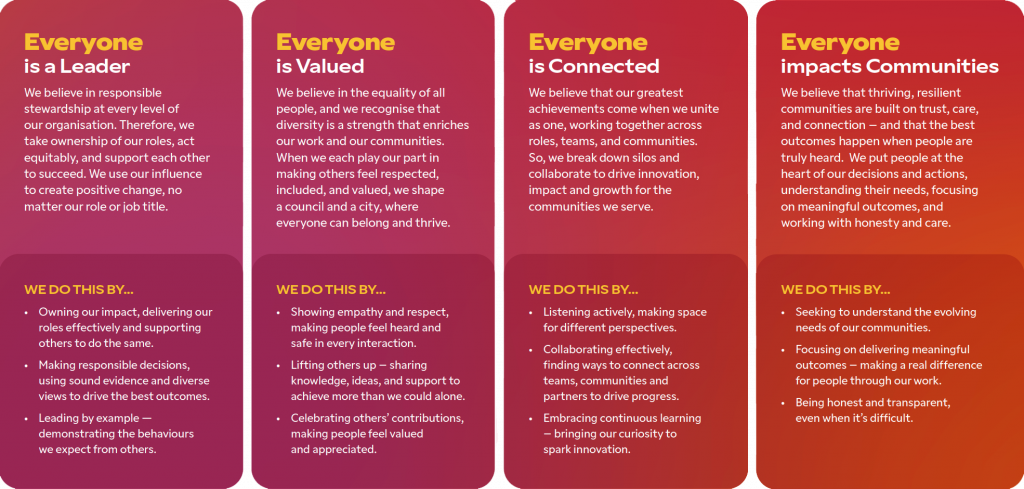About us
About Westminster City Council
Westminster is a unique place at the heart of London: home to 270,000 residents, over 53,000 business and a million visitors a day, centre of the UK government and the seat of the royal family. Our Facts & Figures Infographic illustrates the unique local characteristics of the City, as well as opportunities and challenges facing the City of Westminster.
We seek to be an employer of choice, promoting a culture which is welcoming and accessible to all and provides a work environment free from discrimination, bullying, harassment and victimisation.
We monitor our workforce to measure the impact of our work, contribute to performance indicators and ensure compliance with relevant legislation.
We are committed to using the monitoring information to:
- see if there are differences in the way racial groups are treated
- investigate the underlying reasons for the differences
- deal with any unfairness, disadvantage or possible discrimination.
Further information about our Workforce Profile reports, Gender and ethnicity pay gap reports, Memberships we hold and the various Employee Networks we have can be found here.
Some key numbers
Our Westminster Way
Our purpose
We act together to improve lives for a better Westminster
Our promises

Our principles

Our Approach to Equality, Diversity & Inclusion (ED&I)
At Westminster City Council, we have adopted the London Councils’ anti-racist statement.
Westminster is committed to achieving racial equality because we recognise that persistent racial inequalities are unacceptable and adversely affect everyone.
We know that some groups are more likely to face inequality, experience poor outcomes and to live in poverty. We also know that this is sometimes used as an excuse not to acknowledge racial inequality. But groups don’t happen to be more disadvantaged by chance. Structural disadvantage is rooted in racism and discrimination that is both historical and current.
We do have legislation to protect against overt racism, negative attitudes and treatment, but many of the systems that discriminate do so because of more subtle and covert unchecked “prejudice, assumptions, ignorance, thoughtlessness and racist stereotyping”.
This wording draws on the Macpherson Report 1999 definition of institutional racism which is still relevant today. This is a dehumanising process that is unacceptable and communities are tired of being treated this way.
“Antisemitism is a certain perception of Jews, which may be expressed as hatred toward Jews. Rhetorical and physical manifestations of antisemitism are directed toward Jewish or non-Jewish individuals and/or their property, toward Jewish community institutions and religious facilities.” – International Holocaust Remembrance Alliance (IHRA) definition
“Islamophobia is rooted in racism and is a type of racism that targets expressions of Muslimness or perceived Muslimness.” – All Party Parliamentary Group (APPG) definition
Why it matters that we take an anti-racist approach
We are committed to taking an anti-racist approach because the most damaging aspects of inequality and racism are embedded in society. It is not enough to “not be racist” or to focus on tackling conscious hatred, like racial abuse. It is everyone’s responsibility to proactively and continuously:
- Unpack and reset beliefs, assumptions and values.
- Take action when we observe racism come into play, in beliefs, assumptions and values and the decision and actions that follow, however subtle.
- Be humble and educate ourselves in what we don’t know about racial inequalities and racism that exists, rather than putting the onus on others to educate us.
What we’re doing as an organisation
- Our culture will enable safe learning spaces for all to discuss racism where respectful questions and answers will be the order of the day, we work to ensure that our staff and managers have the required support via training, policies and resources to manage and report racism and racist incidents including provision of support for those who have experienced or observed it.
- We commit to starting the review of all our policies, procedures and services to ensure they are inclusive, equitable and anti-racist, we acknowledge the breadth of this task hence why we commit to starting rather than concluding this.
- We will also be clear with our partners about our expectations of them to both understand and align with our ethos.
Set up a Tackling Inequalities taskforce with partners to have focus and intentional action taking on the intersectional look at inequalities to create equity within and outside our organisation with our communities.
Our EDI Workforce Action Plan 2022-2025 can be viewed here.
